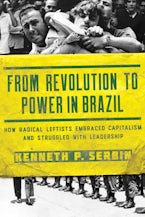"This is an innovative and important work. In-depth research in local and national archives allowed Erik Ching to reveal the formal and informal mechanisms of Salvadoran politics until the eve of the Second World War. This book is an essential reference to understand the roots of political authoritarianism in El Salvador." —Héctor Lindo-Fuentes, Fordham University
"During the 1980s, when El Salvador was in the midst of a terrible civil war, numerous books were written that attempted to explain that small country’s predicament but usually ended up quite short on detail and nuance. Now we have Erik Ching’s very detailed and nuanced study that takes us not only back in time—to the nineteenth and early twentieth centuries—but to local environments where elites and clients interacted to decide the outcome of electoral contests that anointed municipal and national power holders. This book is indispensable for understanding a political culture that combined democratic rhetoric with violence and repression of dissenting points of view." —Knut Walter, author of The Regime of Anastasio Somoza, 1936–1956
"With his Authoritarian El Salvador: Politics and the Origins of the Military Regimes, 1880–1940, Erik Ching makes a significant and original contribution to the historiography of Central America and to debates on patron-client relations and systems of political development. No doubt the enormous empirical research and attention to archival detail he presents will spark debate in the rich and growing literature on politics, democracy, and authoritarianism in post-independence Latin America." —Justin Wolfe, Tulane University
“While El Salvador’s outsized role as a Cold War hot spot has inspired a wealth of scholarly writing, historical studies have not kept pace with the work done in other disciplines. This in-depth study of networks and politics before and after the turn of the 20th century does a great deal to remedy this imbalance. . . . A substantial contribution to the historical literature on Central America and to the wider historiography on links between local and national politics in Latin America.” —Choice
“The book is groundbreaking in its detail and the nuanced insights it offers into nation-state formation; as such, it deserves attention from a wide audience. Beyond area studies and thematic interests, students and teachers of historical methodologies will appreciate the transparency with which Ching analyzes both the voices in the documentary record as well as its silences. . . . [T]he book is groundbreaking in its detail and the nuanced insights it offers into nation-state formation; as such, it deserves attention from a wide audience. Beyond area studies and thematic interests, students and teachers of historical methodologies will appreciate the transparency with which Ching analyzes both the voices in the documentary record as well as its silences.” —American Historical Review
“Ching draws on extensive archival research and offers methodical analyses to make his case, going to great lengths to explain the historiographical significance of his case study. This is clearly a major contribution to the history of authoritarianism in El Salvador and Latin America.” —Historian
“Ching is one of the first scholars to systematically document this unprecedented political opening in Salvadoran history. This finding opens up new lines of inquiry for Salvadoran histiography, especially as this brief democratization relates to subsequent events such as the 1932 uprising and massacre. . . Ching once again offers fresh interpretations to another understudied period of Salvadoran history by illustrating how Martínez used a patronage network similar to the PND’s but also incorporated elements of social reform to provide a modicum of legitimacy that later military governments would emulate, often to the extreme dissatisfaction of the landed elites.” —Hispanic American Historical Review
“A superbly researched study that includes an array of political areas, as, for example, prosopography, political discourse, electoral practice, state building, and network analysis.” —Latin American Research Review











